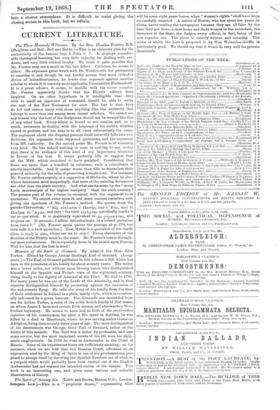CURRENT LITERATURE.
The Ilree Heavenly Witnesses. By the Rev. Charles Forster, B.D. (Deighton and Bell ; Bell and Dakly.)—This is an elaborate plea for the authenticity of the famous text 1 John v. 7. It displays consider- able theological learning, but very little capacity for dealing with evi- dence, and very little critical faculty. We think it quite possible that Mr. Forster may see a merit in this last defect. Criticism he seems to abhor. He expresses great wrath with Dr. Wordsworth for presuming to exercise it, and though he can hardly accuse that most orthodox divine of latitudinarianism, he levels that reproach against another scholar to whom it is scarcely more applicable, Constantine Tischendorff. It is a great offence, it seems, to meddle with the terms receptus. Mr. Forster apparently thinks that the Elzevir editors were inspired. On no other hypothesis is it intelligible that they with so small an apparatus at command, should be able to settle the text of the New Testament for ever. The fact is that they do not and cannot carry with them anything like the authority that belongs to more than one among more recent scholars. We cannot see any reason why the text of the Scriptures should not be treated like that of any other book. Every editor is bound to use caution and, so to speak, reverence in dealing with the language of his author, whether sacred or profane, and his duty is in all cases substantially the same. The argument about the disputed passage itself naturally falls into two divisions, the argument from supposed quotations, and the argument from MS. authority. On the second point Mr. Forster is of necessity very brief. He has indeed nothing or next to nothing to say, seeing that there is no evidence of this kind of any importance whatever in favour of the text. It seems perfectly idle to suggest that all the MSS. which contained it have perished. Considering that there are more than a hundred in existence, such a coincidence is utterly improbable. And it seems worse than idle to depreciate their general authority for the sake of preserving a single text. For instance, Mr. Forster catches eagerly at a suggestion of Michaelis, whom he else- where denounces most unsparingly, that none of the existing documents are older than the sixth century. And what can he mean by the "many Latin manuscripts of far higher antiquity" than the sixth century ? The greater part of the volume is occupied with the argument from quotations. We cannot enter upon it, and must content ourselves with giving one specimen of Mr. Forster's method. Ile quotes from the pseudo-Chrysostom, "'E xixX.nrcei ó rfrzrp, Ecel i TrOc, zed 74
r6 "Aro., and says "the term xis:2,nm: specifically marks it
out as quotation. It is manifestly equivalent to ,:j; 7i7paIrrai, and scriptum est. It amounts, I affirm unhesitatingly, to a formal quotation from verse 7." (Mr. Forster again quotes tho passage at p. 270, but then calls it a tacit quotation.) Now, if this is a quotation of the words 6E;voi rps4 'E's glow, where are we to stop ? Every statement of the doctrine of the Trinity must be the same. Mr. Forster's tone is through- out most acrimonious. He is especially fierce in ha attack upon Person. Well for him that the lion is dead!






























 Previous page
Previous page